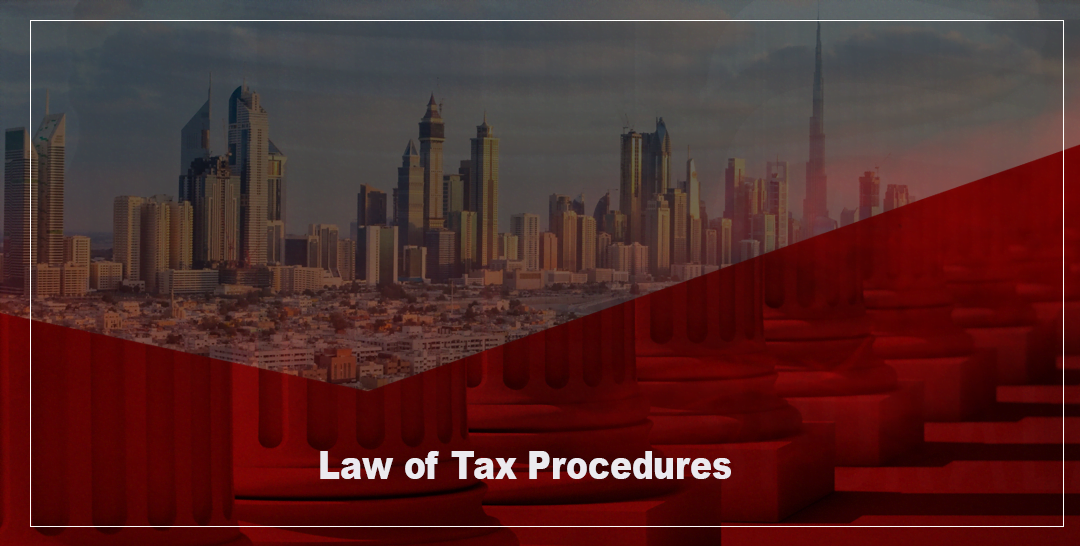Law of Tax Procedures in UAE
Decree No. (28) of 2022 was issued on 30 Sept 2022, regarding the revocation of Federal Law No. (7) of 2017 and issuing new Tax Procedures Law, entering into effect on 1 Mar 2023.
The first chapter of the new Law is concerned with the definitions, objectives, and its scope of application, thus, it regulates the liabilities and rights of the Authority (Federal Tax Authority), taxpayer, and any concerned person to deal with the said Authority under this Law. It also regulates all the procedures and applicable laws of taxes in the territory of UAE.
Further, the second chapter regulates tax liabilities such as holding commercial papers and adhering to the language requirement in submitting all the required documents (Arabic).
The third chapter stipulates the procedures, which the Authority shall follow such as giving notices and its ways, and the procedures that the taxpayer shall follow such as registering in the Tax Agents Registry, and subjecting to the Authority’s tax assessment. In addition, the fifth section of the same chapter of the Law that regulates tax offenses, tax penalties, and their precautionary measures.
Moreover, the fourth chapter states requests to review the Authority’s assessments, objections as well as appeals on it. It also regulates causes to request the tax refund and the ways for its obtaining.
The Law furthermore states the provisions of professional confidentiality, conflict of interest, periods such as tax prescription period and the Authority’s right to claim the payable tax at any time, the Tax distribution restraints, and the impossibility of exemption from it.
The new Law shall replace law No. (7) of 2017 and its amendments, further, revoke any provisions or rulings that are in contrast and/or in conflict with this concerned Law’s provisions.
Moreover, the Executive Regulation of Law No. (7) of 2017 shall be implemented to the extent not in conflict with law No. (28) of 2022 until the issuance of the new Law’s Executive Regulation.
Examples of the changes the new Law made compared to the previous Law:
| Decree of Federal Law No. (7) of 2017 | Decree of Federal Law No. (28) of 2022 |
| Clause No. (3) Art. (17) stated that if the Authority decided to make a tax audit at the taxpayer’s workplace or any place allocated for practicing the work, warehousing the goods, or maintaining the documents relatable to his/her works, then, the Authority shall give him/her a notice five days prior the audit. | Clause No. (2) Art. (16) states that the Authority shall notify the concerned person ten working days prior to the Tax audit.
Clause No. (3) also states that the Authority may carry out the audit at its location, the workplace of the taxpayer, or any other place allocated for practicing the work, warehousing the goods, and maintaining the work documents. |
| Article No. (24) stated: 1. The Authority shall notify the taxpayer within five working days of the issuance of the tax assessment from the date of its issuance in cases stipulated by the law. 2. If the Authority issued a presumed Tax assessment and new information appeared, the Authority shall modify the said assessment and notify the concerned person within five working days from the date of the Authority’s modification. | Article No. (23) modified the Periods prescribed by law No. (7) of 2017 regarding notifying the taxpayer of the issuance of the tax assessment, and the modified one to be ten working days from the date of the issuance, or the modification. |
| Clause No. (3) Art. (25) stated: The Cabinet issues a decree to set out the payable administrative fines for the crimes specified in Clause No. (1) and such fine shall be not less than five (500) hundred AED for any kind of violation and not exceeding triple the fine stated for each violation. | Clause No. (3) & (4) of Art. (25) states that the value of the fine shall not exceed double the value stated by the Cabinet for each violation. |
| Article No. (26) stated Tax evasion penalties to be imprisonment and/or a fine not exceeding five times the value of the tax evaded each of: 1. Abstaining from paying tax. 2. Intentionally lowering the actual cost of the work done. 3. Obtaining unregistered sums from the consumers as taxes. 4. Providing misleading information to the Authority. 5. Destroying or hiding documents that shall be submitted to the Authority. 6. Theft of documents in the possession of the Authority or misusing them. 7. Obstacle the works of the Authority. 8. Intentionally reduce the actual value of the payable tax, or conspire to evade the tax. | Article No. (25) states Tax evasion penalties to be: imprisonment and a fine, not less than the value of the fine evaded and not exceeding the said fine triple or either of these two penalties each of: 1. Abstaining from paying tax. 2. Intentionally reducing the actual value of the payable tax. 3. Obtaining unregistered sums from the consumers as taxes. 4. Conspire to evade the tax. 5. Doing or refraining from doing an act would constitute tax evasion.
Punishment of imprisonment and a fine, not less than the value of the administrative fine and not exceeding its triple or either of these two penalties, shall apply to all who intentionally abstain from paying the administrative taxes.
Punishment of imprisonment and a fine not exceeding million (1,000,000) AED or either of these two penalties each of the following: 1. Providing the Authority with misleading information. 2. Destroying or hiding documents that shall be kept and provided to the Authority. 3. Theft of documents in the possession of the Authority or misusing them. 4. Obstacle the works of the Authority’s employees. This Article added Clause No. (8) regarding the penalty’s Aggravating Circumstance, it states that recidivism is considered an aggravating circumstance, and the recidivist is anyone who was sentenced to a final judgment concerning one of the crimes stipulated in this Article, and he/she committed another crime before the lapse of (5) five years from the date of the said final judgment. Also, Clause No. (10) was added, it stipulates the right of the court to publish the judgment or its conclusion in a proper way, at the expense of the convicted person, and upon the request of the public prosecutor. |
Shura Law firm offers its services in UAE with professionalism and experience, and we’re happy to have you communicate with us in 10 minutes free consultation via Zoom – book your appointment now.



